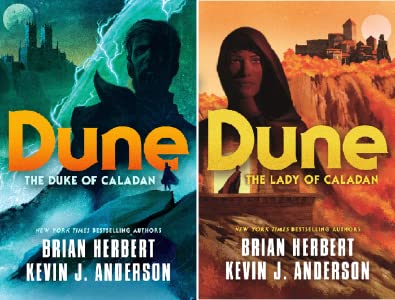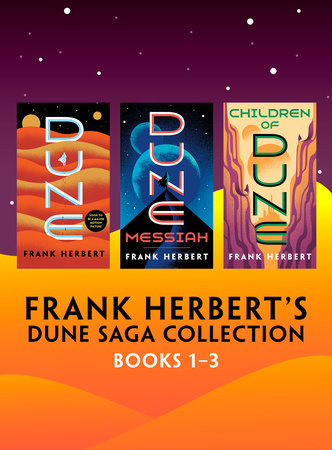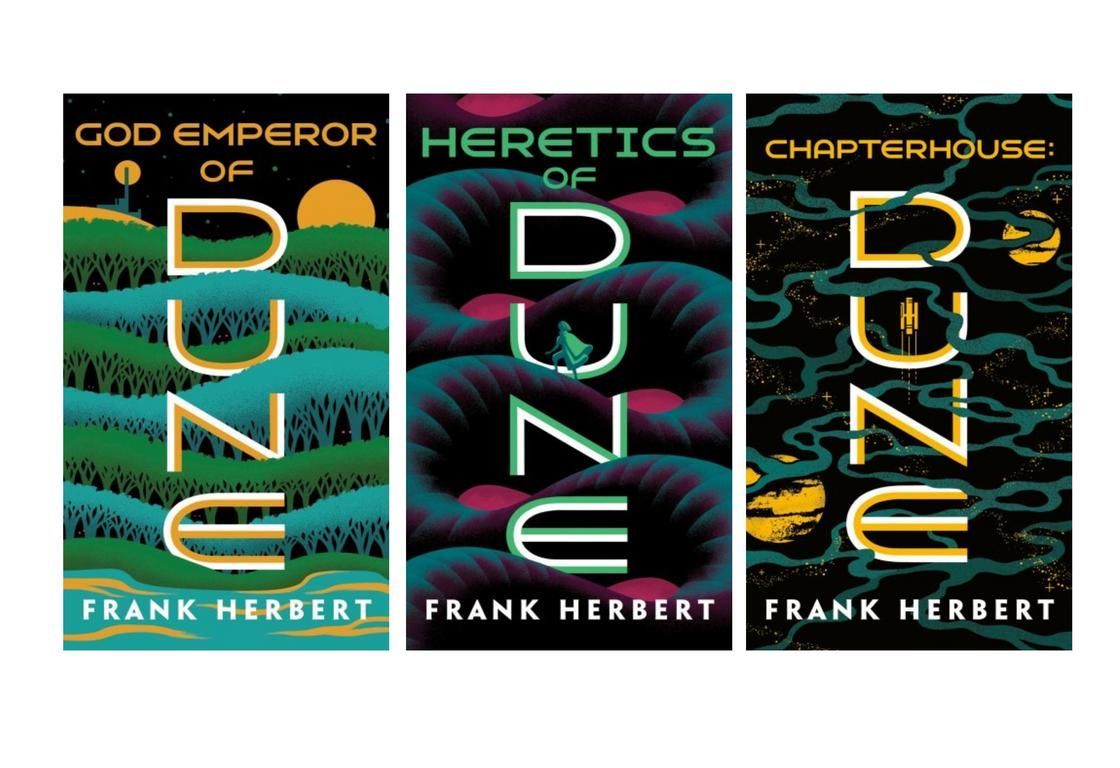There’s a ton of hype surrounding Denis Villeneuve’s upcoming adaptation of Dune. The film has already garnered plenty of positive praise (including from us!) and early box-office numbers from the international markets are promising. With that in mind, you may be suddenly curious about the source material. Frank Herbert’s Dune is perhaps the influential science fiction novel of all time, but the story goes well beyond that first book, which will encompass Villeneuve’s Dune Parts One and the potential Part Two. But picking up Dune isn’t quite so easy to do, either due to the numerous series that are out or the chronology of the books. So to help with this, we’re going to break down the full Dune timeline as seen in the novels, what each series is about, who wrote it and what to expect.
The Legends of Dune
The Legends of Dune trilogy is in fact, not written by the original author, Frank Herbert. He passed away in the early 80s and more than a decade later, his son, Brian, found the notes and manuscripts that his father left behind. With the help of science fiction author Kevin J. Anderson, perhaps best known for his work on the old Star Wars Expanded Universe, the duo got to work in adapting the notes. The prequel novels by Herbert and Anderson are far less philosophical and deliberate than the original texts, leaning heavily into pulp and action, which has alienated fans of the original novels. But if you’re okay with that, this trilogy delves into the Butlerian Jihad, which takes place some 10000 years before the original story and chronicles the war with the “thinking machines” that was mentioned in passing throughout Herbert’s original texts. It’s so far removed from the original story that it can be read independently without interference but it also sets up in the lore, houses and world that will shape the world eons later. It’s worth noting that in the Herbert/Anderson novels, not just this trilogy, some of the story beats actually contradict Frank’s original texts and the now out of print Dune Encyclopedia.

Schools of Dune
Another prequel series from Anderson and Herbert that’s also set tens of thousands of years prior to the story of Paul and his family in the original book, the Great Schools of Dune focuses on the founding of the key factions of the Dune universe. The titles will be obvious to those with the knowledge from the original text, but the three titles in the trilogy are The Sisterhood of Dune, which chronicles the origins of the Bene Gesserit, The Mentats of Dune, which should speak for itself, and The Navigators of Dune, explores the origins of the Navigators Guild.

Prelude to Dune
The set-up to this trilogy is actually quite interesting, it’s up to you if the more casual writing style works for you versus the more philosophical approach of the original works. The Prelude trilogy takes place a generation before the first novel and follows the likes of Duke Leto I and Lady Jessica in the events that set up the events in Dune, chiefly Shaddam Corrino IV’s rise to power, what happens on Ix and the early days of the feud between the Atreides and the Harkonnens. It really leans into the power struggle aspect of these noble houses and the political strife that set the stage for the original novel.

The Caladan Trilogy
The most recent set of books in the Dune universe and as such, only two of the three have been released as of the time of this writing. But the premise is simple as the novels take place years before the events of the main book and follows characters like Duke Leto, Lady Jessica and Paul himself before they moved to Dune, when the Duke, per the official synopsis, discovers “a grand plot to betray the Imperium, and how he rose to prominence in the eyes of the Emperor.” The trilogy sounds like the ideal companion to the Prelude to Dune trilogy.

Frank Herbert’s Original Trilogy
In this particular chunk you’ll find the original novel by Frank Herbert and the source of both the David Lynch film and Denis Villeneuve’s. The book is a masterpiece without a doubt, offering a great mix of philosophy, political intrigue, layered characters, world building and action. The follow-up novels may not have the same highs as that first novel, but they are certainly worth the read and have plenty of interesting story beats, as Dune Messiah picks up many years after the events of the first novel and Children of Dune is subsequently about Paul and Chani’s children and his sister, the regent Empress Alia. Before reading anything on this list, you should absolutely read the first novel. Not because it’s the best, but because it’ll be the least confusing. Diving into the prequels without that foundation may be too complex, despite those stories being simpler. You need the foundation, so start off with it and decide if you want to keep at it.

Heroes of Dune
Chronologically speaking, if you wanted to get some additional information before continuing with Frank Herbert’s novels, you could take a detour and explore a set of books by Anderson and Herbert set between Dune and Dune Messiah. The two novels are Paul of Dune, which features plot points set between Dune and Dune Messiah, but also serves as a prequel to the original novel by flashing back to the War of the Assassins. The second novel, The Winds of Dune, takes place between Messiah and Children of Dune and puts the focus on Lady Jessica.

Frank Herbert’s Follow Up Trilogy
Things get much more bizarre in the following three novels written by Frank Herbert. God Emperor of Dune is more of a philosophical text on the world of Dune than a traditional story and offers up the many musings of the titular Emperor as the world reacts to him some 3000 years after the primary novel. A more traditional narrative continued with Heretics of Dune and Chapterhouse: Dune, the latter of which ended on a cliffhanger note that was made complicated by the fact that Frank Herbert passed away after the completion of the sixth novel.

The End of the Chronicles
Frank Herbert passed away after the release of the sixth book in the Dune franchise, technically leaving his great work unfinished. In 2006, the end of that mainline series began with the release of Hunters of Dune and then Sandworms of Dune, which completed the core chronicles. Despite finishing Frank Herbert’s intended vision, the two books have a mixed reception and are labelled as “Dune-lite” in some cases.
Those are all the Dune books you can get your hands on now. How many have you read and what are your favourite novels outside of the original? Let us know!

5 thoughts on “‘Dune’ Reading Order Guide -ScreenHub Entertainment”